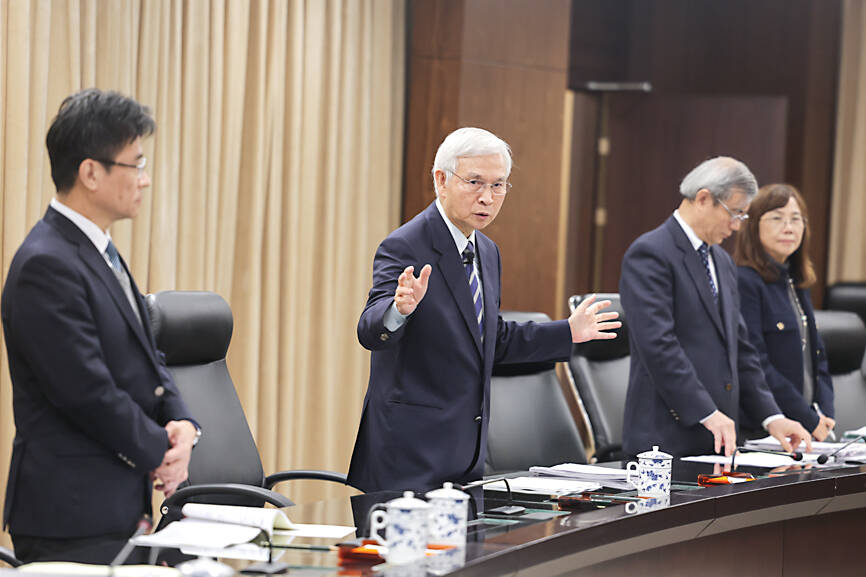The central bank yesterday kept its policy rates unchanged and did not issue new credit controls, as real-estate lending slowed, but remained at high levels.
Central bank Governor Yang Chin-long (楊金龍) at a news conference after the bank’s board meeting described the neutral policy stance as “appropriate” amid slackening inflationary pressure and rising economic uncertainty.
The board decided to hold the rediscount rate steady at 2 percent, the rate on secured loans at 2.375 percent and the rate on short-term financing at 4.2 percent, Yang said.

Photo: CNA
The central bank also raised its forecast for GDP growth to 4.2 percent this year and 3.13 percent next year, without pricing in potential tariff hikes by the US.
US president-elect Donald Trump is set to increase tariffs, but their timetable, gravity and targets remain unclear, the governor said.
Yang dismissed the chance of dovish leaning, saying that tariff hikes would drive up production costs and imported inflation pressure given that Taiwan relies heavily on imported crude oil, raw materials and bulk commodities.
The governor said he took comfort in the shift in local housing market sentiment, although real-estate lending stayed at a concerning high, 37.4 percent in November, versus 37.5 percent in September when the central bank introduced broad credit controls.
“Now, first-home purchases underpin most transactions and people no longer expect housing prices to go uphill,” Yang said, adding that growth in housing and construction loans has slowed.
Yang said the central bank would step up inspections of mortgage operations at local banks next year to make sure they dutifully carry out quantitative control measures to bring down real-estate lending.
The central bank has rejected a few banks’ measures for their lack of effectiveness, Yang said.
He declined to name the lenders or elaborate to avoid “sounding unnecessarily hawkish.”
“The central bank is serious about loan diversification and would demand improvement from laggard lenders during coming inspections,” Yang said.
In particular, the central bank is seeking to root out real-estate lending that is being used for working capital or other accounts, practices that are unfavorable for the banking system’s health and stability, Yang said.
The governor painted the local currency’s depreciation yesterday as “inevitable,” after the US Federal Reserve’s hawkish guidance on its future monetary policy stance shocked the financial markets.

SECURITY: As China is ‘reshaping’ Hong Kong’s population, Taiwan must raise the eligibility threshold for applications from Hong Kongers, Chiu Chui-cheng said When Hong Kong and Macau citizens apply for residency in Taiwan, it would be under a new category that includes a “national security observation period,” Mainland Affairs Council (MAC) Minister Chiu Chui-cheng (邱垂正) said yesterday. President William Lai (賴清德) on March 13 announced 17 strategies to counter China’s aggression toward Taiwan, including incorporating national security considerations into the review process for residency applications from Hong Kong and Macau citizens. The situation in Hong Kong is constantly changing, Chiu said to media yesterday on the sidelines of the Taipei Technology Run hosted by the Taipei Neihu Technology Park Development Association. With

CARROT AND STICK: While unrelenting in its military threats, China attracted nearly 40,000 Taiwanese to over 400 business events last year Nearly 40,000 Taiwanese last year joined industry events in China, such as conferences and trade fairs, supported by the Chinese government, a study showed yesterday, as Beijing ramps up a charm offensive toward Taipei alongside military pressure. China has long taken a carrot-and-stick approach to Taiwan, threatening it with the prospect of military action while reaching out to those it believes are amenable to Beijing’s point of view. Taiwanese security officials are wary of what they see as Beijing’s influence campaigns to sway public opinion after Taipei and Beijing gradually resumed travel links halted by the COVID-19 pandemic, but the scale of

TRADE: A mandatory declaration of origin for manufactured goods bound for the US is to take effect on May 7 to block China from exploiting Taiwan’s trade channels All products manufactured in Taiwan and exported to the US must include a signed declaration of origin starting on May 7, the Bureau of Foreign Trade announced yesterday. US President Donald Trump on April 2 imposed a 32 percent tariff on imports from Taiwan, but one week later announced a 90-day pause on its implementation. However, a universal 10 percent tariff was immediately applied to most imports from around the world. On April 12, the Trump administration further exempted computers, smartphones and semiconductors from the new tariffs. In response, President William Lai’s (賴清德) administration has introduced a series of countermeasures to support affected

Pope Francis is be laid to rest on Saturday after lying in state for three days in St Peter’s Basilica, where the faithful are expected to flock to pay their respects to history’s first Latin American pontiff. The cardinals met yesterday in the Vatican’s synod hall to chart the next steps before a conclave begins to choose Francis’ successor, as condolences poured in from around the world. According to current norms, the conclave must begin between May 5 and 10. The cardinals set the funeral for Saturday at 10am in St Peter’s Square, to be celebrated by the dean of the College